强纲领
“强纲领”及其主要观点
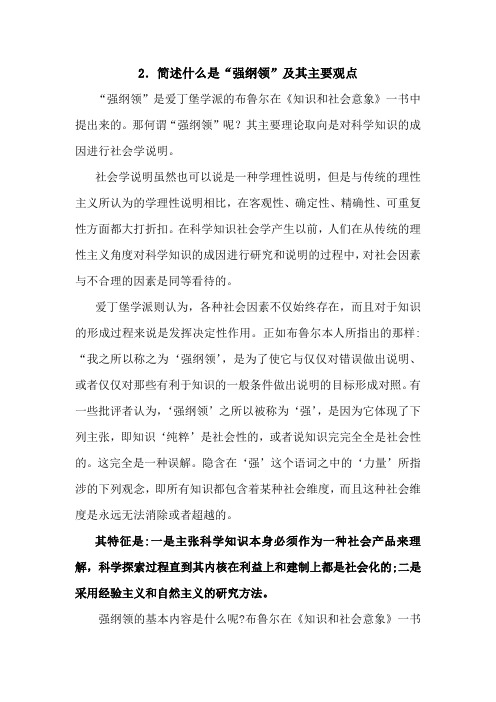
2.简述什么是“强纲领”及其主要观点“强纲领”是爱丁堡学派的布鲁尔在《知识和社会意象》一书中提出来的。
那何谓“强纲领”呢?其主要理论取向是对科学知识的成因进行社会学说明。
社会学说明虽然也可以说是一种学理性说明,但是与传统的理性主义所认为的学理性说明相比,在客观性、确定性、精确性、可重复性方面都大打折扣。
在科学知识社会学产生以前,人们在从传统的理性主义角度对科学知识的成因进行研究和说明的过程中,对社会因素与不合理的因素是同等看待的。
爱丁堡学派则认为,各种社会因素不仅始终存在,而且对于知识的形成过程来说是发挥决定性作用。
正如布鲁尔本人所指出的那样:“我之所以称之为‘强纲领’,是为了使它与仅仅对错误做出说明、或者仅仅对那些有利于知识的一般条件做出说明的目标形成对照。
有一些批评者认为,‘强纲领’之所以被称为‘强’,是因为它体现了下列主张,即知识‘纯粹’是社会性的,或者说知识完完全全是社会性的。
这完全是一种误解。
隐含在‘强’这个语词之中的‘力量’所指涉的下列观念,即所有知识都包含着某种社会维度,而且这种社会维度是永远无法消除或者超越的。
其特征是:一是主张科学知识本身必须作为一种社会产品来理解,科学探索过程直到其内核在利益上和建制上都是社会化的;二是采用经验主义和自然主义的研究方法。
强纲领的基本内容是什么呢?布鲁尔在《知识和社会意象》一书中提出了它的四个信条:其一,它应当是表达因果关系的,也就是说,它应当涉及那些导致信念或者各种知识状态的条件。
因果性信条所规定的实际上是对进行这种研究的基本要求,也就是说,要想研究知识的社会成因,就必须从因果关系的角度出发,去研究究竟是哪些条件使人们形成了特定的信念和知识。
它要求社会学家应当把包括科学知识在内的一切知识和信念,都视为社会因素以及其他因素共同作用的结果。
其二,它应当对真理或谬误、合理性或者不合理性、成功或者失败,保持客观公正的态度。
公正性信条是因果性信条的深化和具体化,要求研究者不仅对任何知识和信念都要解释清楚其产生的原因,而且对于任何知识和信念的正反两个方面也都要同等地解释清楚其产生的原因。
几种西方科学技术社会价值观

(四)科学主义和“反科学思潮”
科学主义试图用科学的标准来衡量裁决
人类的认识和生活,把一切与科学不相 符合的人类认识与价值信仰看作是没有 多少价值的或是错误的,把科学技术看 成是解决人类一切问题的工具。这是科 技乐观论和科技万能论的集中体现,应 该反思批判。 反科学主义不能走向极端,否则会走向 “反科学”,不利于科学技术的发展。
20世纪下半叶出现在西方学术界的“反科学
思潮”,具体表现在激进的后现代主义、 “强纲领”科学知识社会学、极端的环境主 义者等的论述中。它表明科学事业是非常复 杂的,对科学研究纲领、技术设计,以及与 此相关的社会过程的选择,是一个困难而复 杂的问题,应该引起公众和决策层的注意。 但是,如果不加批判地接受,会走向科学技 术悲观论甚至“反科学”,不利于科学技术 的发展和应用。
技术中性论的困难: (1)技术中性论者假定技术的设计者和 使用者能够完全理解技术的目的。但事 实上,技术的大部分后果是难以预见的。 (2)技术一旦增强了控制它的人的权力, 允许一群人统治另一群人,并导致大多 数人反对的后果和影响,这时再宣称技 术是中性的,无疑显得很天真。 (3)人们对技术发展的恐惧与无措。
技术决定论有着深刻的伦理和政治意味。 要求人们不仅在技术的使用阶段,而且 要在技术的设计讨阶段就预见和控制技 术。 困难:人并不是完全泯灭于技术之中。 社会决定论和技术决定论都认为技术是负 载价值的,而不是中性的。
(三)女性主义、后殖民主义科学技 术研究
自上一世纪六十年代,女性主义探讨科学
技术史、科学哲学和科学社会学的相关问 题,形成女性主义科学技术研究。它对科 学技术领域的性别分层原因、科学技术的 性别化特征以及性别建构等作了深入阐述, 给出了许多有价值的思想。从女性主义的 经验主义到立场理论,从差异女性主义到 反本质主义,给我们启发。
“强纲领”理论是“反科学”的滥觞吗?
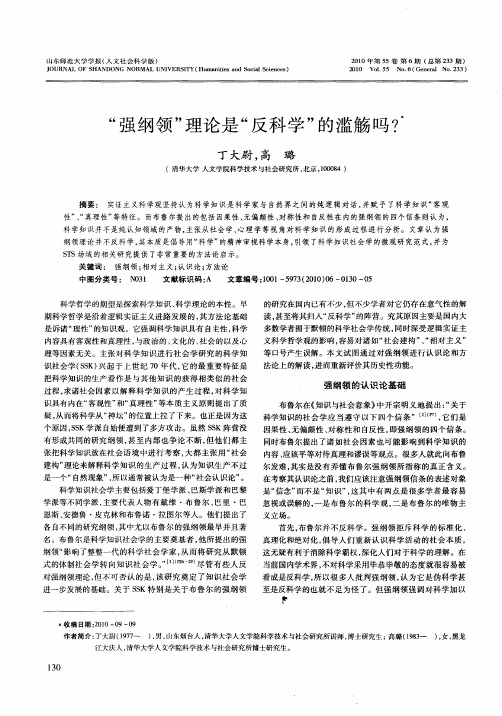
科 学 知 识社 会 学 主 要 包 括 爱 丁 堡 学 派 、 巴斯 学 派 和 巴 黎
纲领“ 影响了整 整一代 的科学社会 学家 , 从而将 研究从 默顿 式的体制社 会学转 向知识 社会 学。 [ { ”1 l 尽管有 些人 反
对强纲领理论 , 但不 可否认 的是 , 该研究 奠定 了知识社会 学 进一步发展的基础。关 于 S K特别 是关 于布鲁 尔的强纲 领 S
当前国内学术界 , 对科学采用毕恭 毕敬 的态度 就很 容易被 不 看成是反科学 , 以很多人 批判强 纲领 , 为它是 伪科学甚 所 认
强纲领 的认识论 基础
布鲁尔在《 知识与社会意象》 中开宗 明义地提 出: 关 于 “ 科学知识的社会 学应 当遵 守 以下 四个信条 ”L , 2 “ 它们是
个原 因,S S K学派 自始便遭到了多方 攻击。虽然 S K阵营没 S
有形成共同的研 究纲领 , 至内部也 争论不 断, 甚 但他 们都 主
各 自不同的研究纲领 , 中尤 以布鲁尔 的强 纲领最早并且著 其
名。布鲁尔是科学知识社会学 的主要 奠基者 , 所提出的强 他
首先 , 布鲁尔并不反科 学 。强纲 领拒斥 科学 的标准化 、 真理化 和绝对化 , 倡导人们 重新认 识科学 活动 的社会 本质 , 这无疑有利 于消除科学霸权 , 深化人们 对于科学的理解。在
把科学知识 的生产看作是 与其 他知识 的获得相类 似 的社 会
过程 , 求诸社会 因素以解释科 学知识 的产 生过程 , 对科学 知 识具有 内在“ 客观性” 真 理性 ” 和“ 等本质 主义原则提 出了质
“强纲领”及其主要观点
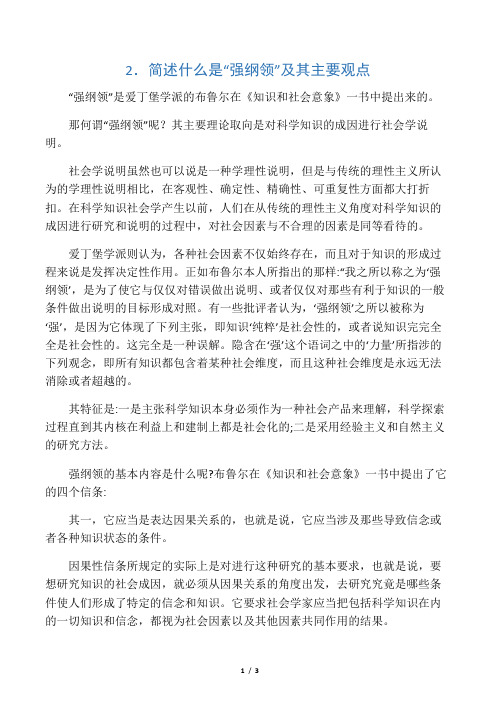
2.简述什么是“强纲领”及其主要观点“强纲领”是爱丁堡学派的布鲁尔在《知识和社会意象》一书中提出来的。
那何谓“强纲领”呢?其主要理论取向是对科学知识的成因进行社会学说明。
社会学说明虽然也可以说是一种学理性说明,但是与传统的理性主义所认为的学理性说明相比,在客观性、确定性、精确性、可重复性方面都大打折扣。
在科学知识社会学产生以前,人们在从传统的理性主义角度对科学知识的成因进行研究和说明的过程中,对社会因素与不合理的因素是同等看待的。
爱丁堡学派则认为,各种社会因素不仅始终存在,而且对于知识的形成过程来说是发挥决定性作用。
正如布鲁尔本人所指出的那样:“我之所以称之为‘强纲领’,是为了使它与仅仅对错误做出说明、或者仅仅对那些有利于知识的一般条件做出说明的目标形成对照。
有一些批评者认为,‘强纲领’之所以被称为‘强’,是因为它体现了下列主张,即知识‘纯粹’是社会性的,或者说知识完完全全是社会性的。
这完全是一种误解。
隐含在‘强’这个语词之中的‘力量’所指涉的下列观念,即所有知识都包含着某种社会维度,而且这种社会维度是永远无法消除或者超越的。
其特征是:一是主张科学知识本身必须作为一种社会产品来理解,科学探索过程直到其内核在利益上和建制上都是社会化的;二是采用经验主义和自然主义的研究方法。
强纲领的基本内容是什么呢?布鲁尔在《知识和社会意象》一书中提出了它的四个信条:其一,它应当是表达因果关系的,也就是说,它应当涉及那些导致信念或者各种知识状态的条件。
因果性信条所规定的实际上是对进行这种研究的基本要求,也就是说,要想研究知识的社会成因,就必须从因果关系的角度出发,去研究究竟是哪些条件使人们形成了特定的信念和知识。
它要求社会学家应当把包括科学知识在内的一切知识和信念,都视为社会因素以及其他因素共同作用的结果。
其二,它应当对真理或谬误、合理性或者不合理性、成功或者失败,保持客观公正的态度。
公正性信条是因果性信条的深化和具体化,要求研究者不仅对任何知识和信念都要解释清楚其产生的原因,而且对于任何知识和信念的正反两个方面也都要同等地解释清楚其产生的原因。
人工智能机器发现系统是对强纲领的经验拒斥吗?——评析围绕计算机模拟科学发现所引发的争论
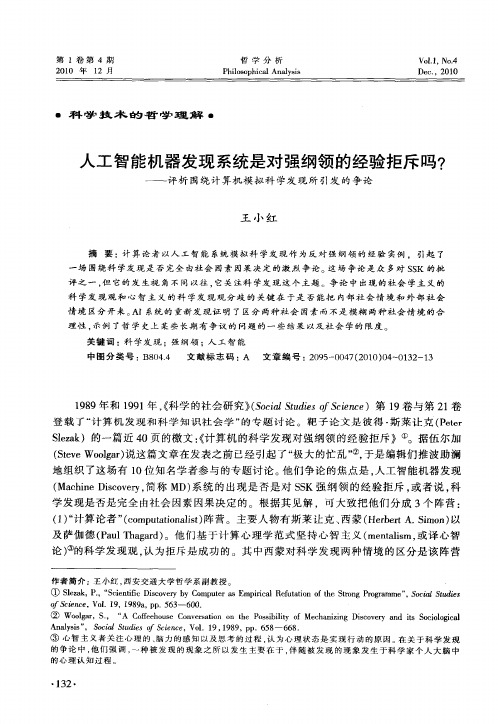
Sea l z k,P. S i n i c Dic v r y Co u e s Emp rc l Re u a in o h to g P o r mme S ca tdis ,“ c e tf s o ey b mp t r a i i a f tto ft e S r n r g a i ” o il S u e
的 心 理 认 知 过 程
-
1 2・ 3
人 工 智 能 机 器 发 现 系 统 是 对 强 纲 领 的 经 验 拒 斥 吗 ?— — 评 析 围 绕计 算 机 模 拟 科 学 发 现 所 引 发 的 争 论
论 点 的基 础 ; 2 “ 构 论 者 ” c n t cii ) 营 。 主 要 人 物有 柯 林 斯 ( r C ln ) ( )建 (o sr t s 阵 u vt Har M. ol s 、 y i
A ayi” oil tde o c ne o.1 18 ,P .6 8 6 8 n l s ,Sca uis f Sic ,V 1 9,9 9 P 5 - 6 . s S e ③ 心 智 主 义 者关 注 心 理 的 、 力 的感 知 以 及 思 考 的 过 程 , 为 心 理 状 态 是 实 现 行 动 的 原 因 。在 关 于 科 学发 现 脑 认 的争 论 中 , 们 强 调 , 种 被 发 现 的 现 象 之 所 以 发 生 主要 在 于 , 随 被 发 现 的 现 象 发 生 于 科 学 家 个 人 大 脑 中 他 一 伴
— —
评析 围绕 计 算 机 模 拟科 学发 现 所 引发 的 争论
王 小 红
摘 要 : 算 论 者 以人 工 智 能 系统模 拟 科 学发 现 作 为 反 对 强 纲 领 的 经 验 实例 .引起 了 计
科学知识社会学的强纲领与传统认识论的冲突和一致
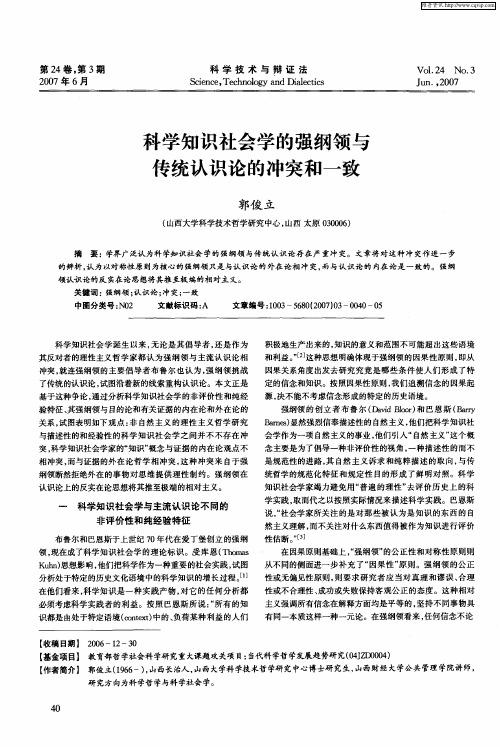
在他们看来, 科学知识是一种实践产物, 对它的任何分析都
必须考虑科学实践者 的利益。按照 巴恩斯所 说 :所有 的知 “ 识都是 由处于特定语境 (o t t中的 、 cne ) x 负荷某种 利益 的人们
有 同一本质这样一种一元论 。在强纲领看来 , 任何信念不论
【 收稿 日期 】 20 —1 — 0 06 2 3
一
是规范性 的进路 , 自然 主义诉求 和纯粹 描述 的取 向 , 其 与传
统哲学 的规范化特征 和规 定性 目的形成 了鲜明对 照。科 学 知识社会学家竭力避免用 “ 遍 的理性 ” 普 去评价历 史上 的科 学实践 , 取而代 之以按照实际情况来描述科 学实践。巴恩斯 说 ,社会学家所关注 的是对那 些被认 为是知识 的东西 的 自 “ 然主义理解 , 而不关 注对什么东西值得被作为知识进行评 价
的规范性概念 , 知识 ” 把“ 看作 “ 任何 一种被 集体接受 的信念 系统”或“ , 人们认为是知识 的任何东西 ……即人们确信并赖 以生存的信 念” _把 “ ;J 真理 ” 6 认定 为 “ 部可 信 的那部分 知 局
积极地 生产 出来 的, 知识 的意义和范围不可 能超 出这 些语境
和利益 。 _这种思想 明确体现于强纲领的因果性原则 , ”2 J 即从
因果关 系角度 出发去研究 究竟 是哪些 条件使人 们形成 了特 定的信念和知识 。按照因果性 原则 , 我们追溯信 念的 因果起
源, 决不能不考虑信 念形成 的特定 的历史语境。
证明是合理地接受的事物 ;真理” “ 是指应该相信 的事物。科
学知识社会学反对传统哲学 的规范性 目的, 也避免使用传 统
种因果解释 , 即必须通过找 出其可信性 的特 殊原因来加 以
解读“强纲领”四信条
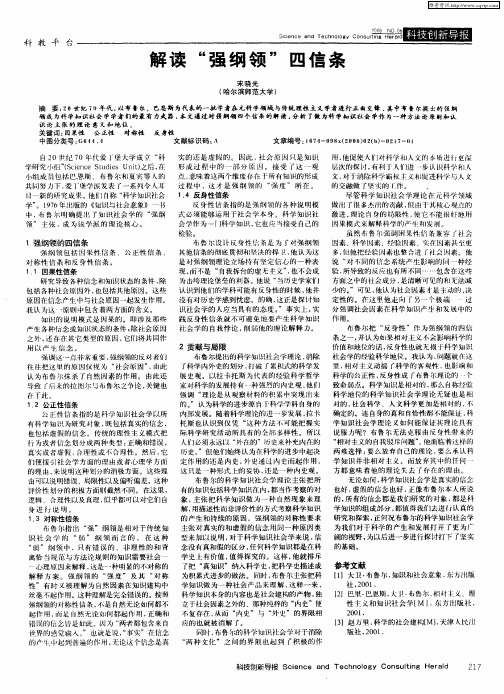
关 键 词 : 果性 公 正性 对 称 性 反 身 性 因 中图分类号 : 4. G6 4 4 文献标 识码 : A
文章编号 : 7 —0 8 ( 0 8 0 () 0 I -0 1 4 9 x 2 0 ) 2b - 2 I 6 7
维普资讯
!
Q:
Sci ce nd en a Tech nol gy o Co nsu tng l i Her d al
科 教 平 台
解 读 “ 纲 领 ’ 信 条 强 ’四
宋 晓 光 ( 哈尔滨 师范大 学)
摘 要 : 2 0世纪 7 0年代 , 以布鲁 尔、巴恩斯 为代表的一批学者在 元科 学领域 与传 统理 性主叉 学者进行正 面交锋 , 其中布 鲁尔提 出的强纲 领 成 为科 学知 识社会 学学者 们的最有 力武 器 , 文通过对 强纲领四个信 条的解读 , 本 分析 了做 为科 学知 识社会 学作 为一种方法论 原则和认
用以产生信念。 强 调达 一点非常 重要 , 强纲 领的反 埘者 们
2贡献与局 限
布鲁 尔提出的科 学知识 会学理论 , 消除 打 往 往把这 的 原因仪视 为 “ 社会 原因” 由此 了科学 内外 史的 划分 , 破 r累积式 的科学发 , 认 为布鲁 尔抹 杀 了自然 凶素的 作用 。 由此 还 展 电观 。以拉 卡托 斯 为代表 的经验 科学 哲学 他们 导致 r后柬的拉 图尔 '4 鲁尔之争论 , - i ; 关键也 家 对科学的发 展持有 一种 强烈的 内电观 , 强调 “ 理论是 从观 察材 料的 积 累中突现 出 来 丁此 。 的。 ”认 为科学的进步源 自丁科学学 科 自身的 1 公正性信条 2 拉卡 公 正性 信条指 的 是科学知 识社会学 以 所 内部发展 。随 着科学理 论的进一 步发展 , 有 科学知 | 为研究 埘象 包括真 实的信 念 , 托 斯也 认识 到仅 凭 “ 只 既 这种 方法 可能 把握 实 也包括 虚 假的 信念 。传统 的理性 主义 模式把 际科学 研 究活动 所具 有的 全部 多样性 。所以 外在的”历史来补 充内在的 行 为或者 信念 划分 成两种 类型 : 正确和错 误 , 人们必须 永远 以 “ ”但他 们始终 认为 科学 的进步 中起决 真灾 或者 唏假 , 合理性 或不 合理性 。然后 , 它 历 史。 外 们 便援 引社会学 方面 的理 由或者 心理 学方 面 定 作用的还 是 内史 , 史通过 内 电而起 作用 , 的理 由 , 来说 明这种 分的消极 方面 。这些 理 这 只是 一种形式 上的 妥协 , 还是 一种 内史现 。 布鲁 尔的 科学 知识 社会学 理论 主 张把 所 由可以 晚明错 误 、 局限性以 及偏听 偏差。这种 评价性 划分的积极 方面 0 截然不 同。 在这里 , 有 的知 识 包括科学 知识在 内 , 当作考察 的对 都 主张 把 科学 知 识做 为一 种 自然 现 象来 理 逻辑 、合理性 以及真理 , 似乎都可以 对它们 自 象, 解, 用描述性 而非评价性 的方式 考察科学知识 身 进 行 | 明 兑 的产 生和持 续的 原 因。强 纲领 的对称 性要 求 1 3 对称性信 条 . 布 鲁尔指 出 “ 强” 纲领 是相 对 于传统 知 主张 对真 实的 和虚假 的信 念用 同一种 原 因类 对于 科学知识 社会 学来说 , 信 识 社 会 学 的 “ ” 纲 领 而 言 的 ,在 这 种 型来加 以说 明 , 弱 “ ”纲 领 中 ,只有错 误 的 非 理性 的 和 背 念没有真 和假的区分 , 何科学知识都 是在科 弱 任 学 史上有价 值 , 值得 探究 的 。这 样 , 他就 排 斥 离恰 当规范 与 方法论规 则 的知识需 要社 会 心理 原因来解释 , 这是一一 种明显的不对称 的 了把 “ 真知识 ”纳 入科学 史 , 把科学 史描述 成 解释方案。强纲领的 “ 强度 ” 及其 “ 称 为积累式进步的做 法 。同时 , 对 布鲁 尔主张把 科 这样 一 来 , 性” 有时 又被 理解 为 自然 因素 征知识 建构 中 学 知识做 为一 种社会 产 品束理 解 , 独 丝毫不起 作用。这种理解是完 全错误 的。按 照 科 学知 识本 身的内容也是 社会建构的 产物 , 那种纯 粹的 “ 内史”便 强纲领 的对称性 信条 , 小是 自然无论 如何都 不 立 于社 会因素之外 的 、 从而 “ 内史” 与 “ 电” 的界 限相 外 起 作 用, f 自然 无论如 何都起 作 用 , 确 和 而是 正 不复存在 , 错 俟的 信念皆是如此 。 为 “ 两者 都包含来 自 应的也就 被消 解 了。 世界的感觉输 入。 也鞔是说 ,事 实”在 信念 ” “ 同I , 1 布鲁 尔的科学 知识祉会学 对于消除 r 两 的 产, 中起到普 遍的 作用 , 沦这 个信念是真 “ 种 文 化” 之 间 的界 限 也起 到 r积极 的 作 { 无
“强纲领”及其主要观点
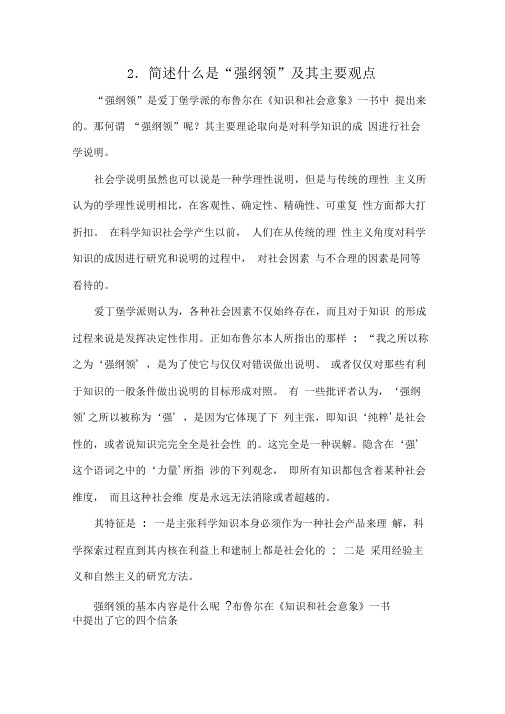
2.简述什么是“强纲领”及其主要观点“强纲领”是爱丁堡学派的布鲁尔在《知识和社会意象》一书中提出来的。
那何谓“强纲领”呢?其主要理论取向是对科学知识的成因进行社会学说明。
社会学说明虽然也可以说是一种学理性说明,但是与传统的理性主义所认为的学理性说明相比,在客观性、确定性、精确性、可重复性方面都大打折扣。
在科学知识社会学产生以前,人们在从传统的理性主义角度对科学知识的成因进行研究和说明的过程中,对社会因素与不合理的因素是同等看待的。
爱丁堡学派则认为,各种社会因素不仅始终存在,而且对于知识的形成过程来说是发挥决定性作用。
正如布鲁尔本人所指出的那样: “我之所以称之为‘强纲领' ,是为了使它与仅仅对错误做出说明、或者仅仅对那些有利于知识的一般条件做出说明的目标形成对照。
有一些批评者认为,‘强纲领'之所以被称为‘强' ,是因为它体现了下列主张,即知识‘纯粹'是社会性的,或者说知识完完全全是社会性的。
这完全是一种误解。
隐含在‘强'这个语词之中的‘力量'所指涉的下列观念,即所有知识都包含着某种社会维度,而且这种社会维度是永远无法消除或者超越的。
其特征是: 一是主张科学知识本身必须作为一种社会产品来理解,科学探索过程直到其内核在利益上和建制上都是社会化的; 二是采用经验主义和自然主义的研究方法。
强纲领的基本内容是什么呢?布鲁尔在《知识和社会意象》一书中提出了它的四个信条其一,它应当是表达因果关系的,也就是说,它应当涉及那些导致信念或者各种知识状态的条件。
因果性信条所规定的实际上是对进行这种研究的基本要求,也就是说,要想研究知识的社会成因,就必须从因果关系的角度出发,去研究究竟是哪些条件使人们形成了特定的信念和知识。
它要求社会学家应当把包括科学知识在内的一切知识和信念,都视为社会因素以及其他因素共同作用的结果。
其二,它应当对真理或谬误、合理性或者不合理性、成功或者失败,保持客观公正的态度。
自然辩证法知识点总结

自然辩证法知识点总结(by 娜娜)第二章科学认识论和方法论1、归纳主义:归纳推理过程:单称陈述→全称陈述→(通过归纳法)科学知识困难:逻辑论证上不可能(无法穷尽观察)(归纳主义火鸡)(课堂练习考过)经验论证无效(循环论证)2、证伪主义:基本主张可证伪度、明晰性、精确性特设性假定3、研究纲领:不应该做什么的指导方针:研究纲领的硬核和保护带硬核:基本假定,整套科学理论的基础和核心保护带:保护硬核不被证伪的辅助条件和初始条件应该做什么的指导方针:如何补充硬核、保护和扩大保护带、发展适当的数学和实验技术等4、范式:一门成熟科学由一种范式支配.即范式为合理工作规定标准,指导常规科学家“解决难题”的活动.有没有这样一个维持常规科学传统的范式存在,是科学与伪科学的区别标志•范式的组成部分:•基本定律与理论假定•应用定律到不同类型情况中去的标准方法•必须的仪器和使用技术•形而上学原则:如存在着一个独立于人的客观世界•非常一般的方法论假定如:认真努力使你的范式与自然匹配合理工作规定标准(有无范式为区别科学和伪科学的标志)组成部分:基本定律与理论假定;应用定律到不同类型情况中去的标准方法;必须的仪器和使用技术;形而上学原则;非茶馆一般的方法论假定库恩的难题:(1)范式的无法定义与多义性(2)夸大了范式之间的对立5、对科学的三种理解方式:主观主义(如逻辑主义、归纳主义)、约定主义(如范式)、客观主义(如实在论)6、实在论与工具主义多元实在论:实在世界是多元的因而与自然匹配的科学理论不是唯一的(课堂练习)第三章科学发展的历史1、人类文化的结构:技术系统、社会系统、思想意识系统2、科学不同层面:器物层面物质文化技术系统体制层面制度文化社会系统解释层面观念文化思想意识系统精神层面观念文化思想意识系统3、古代科学亚里士多德:哲学和科学诞生条件:惊异、闲暇、自由古希腊自然哲学为科学大厦挖地基欧几里得几何学科学大厦第一根柱基阿基米德力学最具科学特征的古代科学成就托勒密天文学用数学解释自然的第一项重大科学成就盖伦医学希腊科学衰落时期的最好成果4、中世纪科学古代科学的衰落十字军东征和西欧封建城堡制的瓦解阿拉伯人的贡献亚里士多德主义兴起和被改造(1)重新发现古希腊(2)大学创立(3)逻辑论证上帝存在(4)新教出现(5)改革教义(6)实验研究自然界5、现代科学科学革命是人类文明发展史上的最大事件科学革命发生的历史条件(1)西欧封建城堡制的瓦解(2)手工工场与技术进步(3)远航探险和地理发现(4)文艺复兴促进科学解放科学革命的主要成就(1)牛顿体系(解释层面)(2)工业革命(器物层面)(3)科学凝聚性结构和人类现代文明的形成(精神层面、体制层面)6、后现代科学科学的社会角色发生巨大变化科学知识增长的指数规律:(1)德堪多(计量研究的先驱)(2)洛特卡定律Fn=c/n2第四章科学的社会学研究1、科学社会学的早期历史(最初源头与萌芽阶段)2、科学建制社会学科学的规范结构(普遍性universalism、共享性communism、无私利性disinterestedness、有条理的怀疑主义organized skepticism)科学知识社会学中的强纲领:因果性、公正性、反身性、对称性科学实践社会学特征:(1)研究科学具体实践(2)客观自然和社会因素的同等重要性(3)取消社会/自然、主/客观二分法3、宏观取向的科学社会学4、实证主义科学观对默顿科学建制社会学的影响第五章中国近现代科技发展史1、中国近现代科技发展的三阶段:(1)启蒙期(2)体制形成期(3)现代发展期2、中国科学启蒙三部曲(1)外国传教士(2)洋务运动(3)戊戌维新到五四新文化运动标志性事件:异质文化:利玛窦主要内容:从传统的心态向现代心态的转变3、体制形成期时间:完成心态转变标志性事件:科学体制在中国的确立主要内容:体制模式转变4、现代发展期时间:完成体制转变标志性事件:苏联模式的建立主要内容:动力转变第六章中国科学启蒙的基本特征及社会文化后果1、中国科学启蒙的三段式:言技、言政、言教2、中国科学启蒙的基本特征:(1)科学含义的偏差(2)启蒙目的的限制(3)启蒙方法的错误3、科学在中国发生形变的典型表现:(1)自然科学批判运动及其科学后果在中国和苏联的对比(2)科学家个人在科学争论中的立场与政治立场的紧密联系4、科学观念在中国发生改变的三部曲:(1)复杂的凝聚性整体结构图示被简单的单一层面图示所代替(2)精神层面或价值用来替代任何层面和整个科学(3)科学的权威性用来替代科学,科学成了“赛菩萨”5、科学形变引起的四个层面的变化科学观念的改变科学体制层面的改变---行政体制科学解释层面的改变科学器物层面第七章、政策中的选择和平衡问题1、基础研究的特点与功能⏹特点:⏹基础性:三层含义⏹ 1.1.2先导性:经济效益的间接性、潜在性,成果的公开性、无偿共享特性⏹ 1.1.3创造性:成果的实现更难把握和预测、工作更富理论抽象性、更依赖科学家个人的创造性思维⏹、先导性⏹ 1.2.1应用研究直接指向技术应用和生产实践⏹ 1.2.2应用研究同各国国情密切相关⏹ 1.2.3应用研究是影响国家技术水平的关键环节⏹、创造性⏹ 1.3.1技术开发成果是科技生产力的承载者:技术成果的应用改变生产方式、生活方式、思维方式、管理方式⏹ 1.3.2技术扩散比发明更重要:生产力作用通过技术扩散才能体现出来⏹ 1.3.3技术发明创造者与成果拥有者分离:技术专利与技术转让2、应用研究的特点和功能(1)直接指向技术应用和生产实践(2)同各国国情密切相关(3)影响国家技术水平的关键环节3、技术开发的特点与功能(1)技术开发成果是科技生产力的承载者(2)技术扩散比发明更重要(3)技术发明者与成果拥有者相分离1、基础研究的特点和功能A、基础性:三层含义:(一切教育研究的基础、国民经济发展的基础、综合国力竞争的基础)。
论爱丁堡学派科学知识社会学的强纲领构建
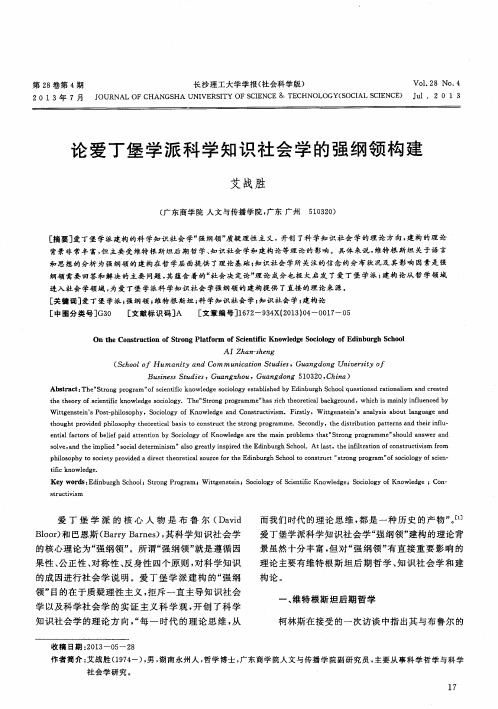
AI Zhan - s he n g
( S c h o o l o f Hu ma n i t y a n d C o n mu r n i c a t i o n S t u d i e s , G u a n g d o n g U n i v e r s i t y o f
Bu s i n e s s St u di e s ,Gu a n g z h o u,Gu a n gd o n g 5 1 0 3 2 0, C^ i n a)
Ab s t r ac t: The ” St r o n g p r o g r a m” o f s c i e n t i f i c k n o wl e d g e s o c i o l o g y e s t a b l i s he d b y Ed i n b ur gh S c h o o l q u e s t i o ne d r a t i o n a l i s m a n d c r e a t e d
[ 关键 词 ] 爱 丁堡 学 派 ; 强纲领 ; 维特根斯坦 ; 科 学知识社会 ; 知识社会 学; 建 构论
[ 中 图分 类 号 ] G3 0
[ 文献 标 识 码 ] A
[ 文章编号] 1 6 7 2 —9 3 4 X【 2 0 1 3 ) O 4 一O O 1 7 一O 5
On t h e Co n s t r uc t i o n of S t r o ng Pl a t f o r m o f S c i e nt i f i c Kn o wl e dg e S o c i o l o g y of Edi nbu r gh Sc ho o l
背景非常丰富 , 但 主要 受 维特 根 斯 坦 后 期 哲 学 、 知 识 社 会 学和 建 构 论 等 理 论 的 影 响 。 具 体 来 说 , 维 特 根 斯 坦 关 于 语 言
布鲁尔科学知识社会学强纲领的四条原则包括

布鲁尔科学知识社会学强纲领的四条原则包括布鲁尔科学知识社会学是一种基于社会学和科学哲学的理论框架,旨在探讨科学知识的社会构建和影响。
在布鲁尔科学知识社会学的强纲领中,有四条重要原则,分别是:批判性、相对性、建构性和互动性。
本文将从这四个方面进行阐述,以便更好地理解布鲁尔科学知识社会学的核心观点。
批判性是布鲁尔科学知识社会学的重要原则之一。
它强调对科学知识的批判性思考和质疑。
批判性思维是指对科学观点和理论进行审视和评判的能力。
在布鲁尔科学知识社会学中,批判性思维是发现科学知识的局限性和偏见的关键。
通过批判性思维,我们能够更全面地理解科学知识的社会背景和制约因素,从而对科学知识的可靠性和普适性进行评估。
相对性是布鲁尔科学知识社会学的另一个重要原则。
相对性强调科学知识是相对于特定社会和文化背景而言的。
科学知识的产生和传播受到社会和文化因素的影响,不同的社会和文化背景可能导致不同的科学观点和理论。
相对性的概念提醒我们,在理解和运用科学知识时,需要考虑其相对性和局限性,并避免将特定的科学观点和理论绝对化。
第三,建构性是布鲁尔科学知识社会学的核心原则之一。
建构性强调科学知识的社会建构性和历史建构性。
科学知识是通过社会实践和历史进程逐步建构起来的,它不是与社会和历史脱离的客观存在。
建构性的观点提醒我们,科学知识的生成和发展是一个社会和历史的过程,需要考虑到不同社会和历史条件下的科学实践和观点。
互动性是布鲁尔科学知识社会学的最后一个原则。
互动性强调科学知识与社会实践和公众之间的相互作用。
科学知识不仅仅是由科学家们在实验室中生成的,更是在社会实践中得到验证和应用的。
互动性的观点提醒我们,科学知识的有效性和影响力取决于与社会实践和公众之间的互动关系。
只有通过与社会实践和公众的互动,科学知识才能更好地为社会发展和人类福祉服务。
总结来说,布鲁尔科学知识社会学的强纲领包括四条原则:批判性、相对性、建构性和互动性。
这些原则强调了科学知识的社会构建和社会影响,提醒我们在理解和应用科学知识时要具备批判性思维、考虑相对性、关注建构性和重视互动性。
SSK对科学知识的解蔽——兼评布鲁尔的《知识和社会意象》

识、 神话 、 宗教、 哲学 、 艺术 等各种信 念系统都 被纳入 了知识
以其提出的“ 纲领 ” 强 著称 , 支撑 S K学说 的研究 纲领—— S
强纲领就是在《 知识和社会意 象》 书 中提 出来的。就此而 一 言 ,知识和社 会意象 》 《 堪称 S K 的经典 之作 , 果 要 了解 S 如 SK的基本思想 , S 这是一本 必读 的书。《 知识 和社会意象》 的 理论贡献主要体现在 , 分析强调了知识和社会 意象 之间的关 系, 通过阐述强纲领理论 , 对包括 科学知 识在 内的人类 知识 成因进行 了相对主义的说 明。我 们这里 拟概要 评述强 纲领
明 。许 多人 并 不 否 认 科 学 知识 的 产生 会受 社 会 因 素 的 影 响 ,
地强调社会 因素在一切知识 中均起作用的主张 , 主要理论 其
取 向是对科学知识 的成 因进行 社会学说 明。为达到这一 目
的, 强纲领提出了以下四项 原则 : 1 因果 性 , () 指能导致信念 或知识诸状态 的条 件都应 该 是因果性 的; 2 公正性 , () 指不
论 真或假 、 合理性或非合理性 、 功或失败 , 成 都要公正地加 以 同样对待 ;3 对称性 , () 指在说 明的样式上应该 是对称的 , 同
样 的原 因应 同时 能解 释 真实 的和虚假 的信 念 ;4) ( 反身性 ,
指 原 则 上 它 的各 种说 明模 式 必 须 同样 适 用 于 社 会学 本
“社会协商知识观”的困境与出路——对强纲领的一个批判

摘
要: 强纲领认为所有知识都是协商的。其论 证过 程是以否认知识的确定性、 否认跨 文化的知识交流、 否认知识 - 9
信念 的区别 、 忽略根据社会 因素 的关系类型和关联程度对知识进行分 类, 因而是缺乏说服力 的。要走出这 一困境 , 必 须重新建构科学知识 与社会 因素关 系的模型。 关键 词 : 强纲领; 知识观; 社会协商
所在 。 第二 , 否认跨文化的知识交 流。 强纲领 的各种知识规则 和社会协 商真理观为解 释跨 文化 的知识交 流设 置了障碍 , 这 与不同的文化群体之 间不仅 有知识 的交流 , 而且有文学艺术 的交 流的社会学事实相矛盾 。 第三 , 否认知识和信念的区别 。 强纲领把知识 与信念相等 同作为前提 , 导致 了极端的相对主 义结 论 , 而这个前 提假定并没有可靠的论证。 四, 第 忽略了根 据社会 因素 的关系类型和关联程度来对知识进行分类 。 这使 得强纲领 的知识社会学不仅没有推进曼海姆 的知识社会学 , 反而使之倒退 了。 科尔根据共识程度的高低将知识划分为核 心知识和前沿知识 , 其实也是知识确定性和不确定性的另一 种形式 , 但并没有说明影响前沿知识评价的社会因素究 竟是 什 么以及在前沿知识 转化为核 心知识的过程 中社会 因素是 怎样起作用的。值得我们探讨 。 三、 重建科学知识与社会因素关系的模型 针对强纲领及其科学知识社会学面临 的问题 我认为 ,
确定都是社会 协商的结果 , 其知识 的极端相对 主义特征表现 得淋漓尽 致。 正因为如此 , 强纲领才是 贡献 和问题并存。 我认 为其问题表现在四个方 面: 第一 , 否认知识 的确定性 。知识是确定性和不确定性 的 图用 社 会 学 完 而 试 全取代认识论 或知识论 的研究 。实际上 , 认识论的难题并非 是不能容纳科学知识的不确定性 , 而是知识 同时具有确定性 和不确定性 。如果 知识 仅仅是相对的 , 就不存在认识论难题 了。这样 , 强纲领的知识社会学一开始就误解 了问题的本质
爱丁堡学派的理论困境及其反思

爱丁堡学派的理论困境及其反思科学知识社会学产生于20世纪70年代,以其激进的科学建构论主张迅速产生了国际性影响。
虽然科学知识社会学派系分化且观点不尽相同,但他们有一个共同的主张:科学知识的内容不是对自然界的描述,而是社会性地建构出来的,因而科学知识社会学又被称为“社会建构主义”。
爱丁堡学派是科学知识社会学流派中发展最为成熟、最具代表性的学派。
爱丁堡学派的产生具有深刻的哲学渊源。
在爱丁堡学派的起源与发展的过程中影响较大的有休谟的经验论、逻辑经验主义、波普尔的证伪主义、库恩的历史主义、费耶阿本德的“无政府主义”等,这些认识论上的经验主义、相对主义思想的导向及维特根斯坦关于“生活世界”的思想等等,都在很大程度上影响了科学知识社会学的产生与发展。
在这样的情况之下,爱丁堡学派首先对哲学进行了猛烈的抨击,抬高社会学的地位,提出了强纲领。
强纲领为爱丁堡学派带来广泛支持的同时,也遭到了更多人的反对,强烈的批评不仅揭示了强纲领的内在矛盾,侵蚀着科学知识社会学生存和发展的合理性基础,而且也造成了科学知识社会学内部的理论混乱。
在强纲领内在理论矛盾的困扰下,科学知识社会学各个亚纲领的实践者,都以不同的方式对强纲领进行了改进,从而不仅导致强纲领向“弱”纲领的转变,而且还引起了科学知识社会学内部广泛的理论纷争。
对于外界的批评,爱丁堡学派自然也不会坐以待毙,对自己的纲领也进行了自我辩护并且提出了后期的社会学有限主义。
然而,从总体上看来,不同的亚纲领并不能超越强纲领所设置的理论框架,因此也不可能从根本上克服强纲领内在的理论矛盾。
本文从科学知识社会学的兴起和爱丁堡学派的产生,爱丁堡学派的主要理论和所面临的理论困境以及爱丁堡学派之后的出路四部分着手,对爱丁堡学派进行了整体研究,并对其今后发展的出路给出自己的看法与见解。
第一部分论述科学知识社会学的兴起以及科学知识社会学的代表学派爱丁堡学派产生的哲学来源、社会学来源和文化背景。
阐明了维特根斯坦后期哲学是爱丁堡学派的思想渊源,以及爱丁堡学派对库恩的科学哲学的发展;二战后科学霸主地位的确立、“大科学”观念的形成是爱丁堡学派产生的文化背景。
“强纲领”及其主要观点
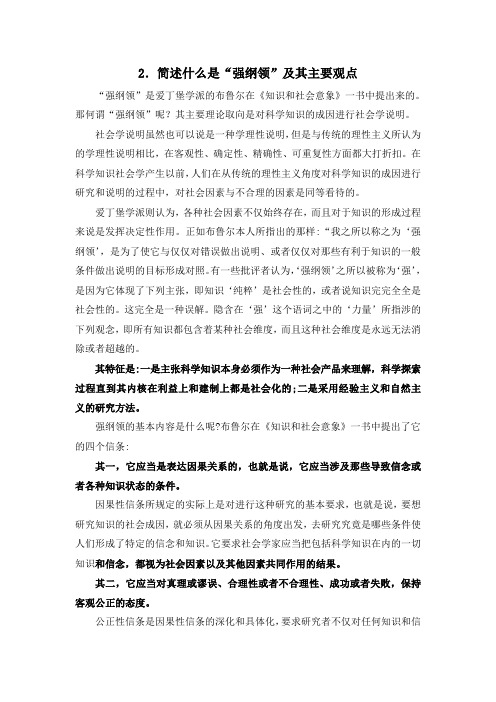
2.简述什么是“强纲领”及其主要观点“强纲领”是爱丁堡学派的布鲁尔在《知识和社会意象》一书中提出来的。
那何谓“强纲领”呢?其主要理论取向是对科学知识的成因进行社会学说明。
社会学说明虽然也可以说是一种学理性说明,但是与传统的理性主义所认为的学理性说明相比,在客观性、确定性、精确性、可重复性方面都大打折扣。
在科学知识社会学产生以前,人们在从传统的理性主义角度对科学知识的成因进行研究和说明的过程中,对社会因素与不合理的因素是同等看待的。
爱丁堡学派则认为,各种社会因素不仅始终存在,而且对于知识的形成过程来说是发挥决定性作用。
正如布鲁尔本人所指出的那样:“我之所以称之为‘强纲领’,是为了使它与仅仅对错误做出说明、或者仅仅对那些有利于知识的一般条件做出说明的目标形成对照。
有一些批评者认为,‘强纲领’之所以被称为‘强’,是因为它体现了下列主张,即知识‘纯粹’是社会性的,或者说知识完完全全是社会性的。
这完全是一种误解。
隐含在‘强’这个语词之中的‘力量’所指涉的下列观念,即所有知识都包含着某种社会维度,而且这种社会维度是永远无法消除或者超越的。
其特征是:一是主张科学知识本身必须作为一种社会产品来理解,科学探索过程直到其内核在利益上和建制上都是社会化的;二是采用经验主义和自然主义的研究方法。
强纲领的基本内容是什么呢?布鲁尔在《知识和社会意象》一书中提出了它的四个信条:其一,它应当是表达因果关系的,也就是说,它应当涉及那些导致信念或者各种知识状态的条件。
因果性信条所规定的实际上是对进行这种研究的基本要求,也就是说,要想研究知识的社会成因,就必须从因果关系的角度出发,去研究究竟是哪些条件使人们形成了特定的信念和知识。
它要求社会学家应当把包括科学知识在内的一切知识和信念,都视为社会因素以及其他因素共同作用的结果。
其二,它应当对真理或谬误、合理性或者不合理性、成功或者失败,保持客观公正的态度。
公正性信条是因果性信条的深化和具体化,要求研究者不仅对任何知识和信念都要解释清楚其产生的原因,而且对于任何知识和信念的正反两个方面也都要同等地解释清楚其产生的原因。
中国大学科研理念的“强纲领”——兼论大学科研活动中的扭曲机制
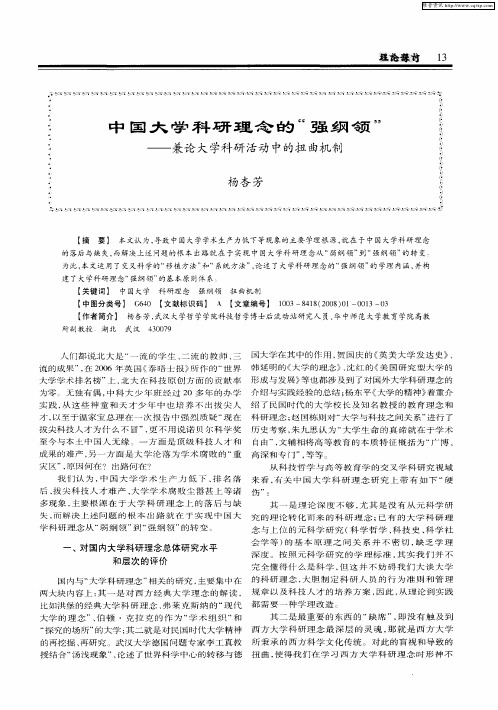
矗 ■ 、_ 、
‘ 二 , ≯ I
成 果 的难 产 , 一 方 面 是 大 学 沦 落 为 学 术 腐 败 的 “ 另 重 高 深 和 专 门 ”, 等 。 等 灾 区 ”, 因何 在 ? 出路 何 在 ? 原 从 科技 哲学 与高 等教育 学的交叉 学科 研究视域
失 , 解 决 上 述 问 题 的 根 本 出 路 就 在 于 实 现 中 国 大 究 的 理 论 转 化 而 来 的 科 研 理 念 ; 有 的 大 学 科 研 理 而 已
学科研 理念从 “ 纲 领” “ 纲 领 ” 转 变 。 弱 到 强 的
一
、
对 国 内大 学科研 理念 总体研 究水平
一
—
兼论 大学科研活动 中的扭 曲机制
杨杏 芳
! _ :
_
;
_
Байду номын сангаас
!
! ,’
_
_
_
:
:
:
一
、
【 摘
要 】 本文认 为, 导致 中国大学学术生产力低 下等现 象的主要 学理根 源, 就在于 中国大学科研 理念
的 落后 与缺 失 , 解 决上 述 问题 的 根 本 出路 就 在 于 实现 中 国大 学科 研 理 念 从 “ 纲 领 ” “ 纲 领 ” 转 变 : 而 弱 到 强 的
比如 洪 堡 的 经 典 大 学 科 研 理 念 、 莱 克 斯 纳 的 “ 代 都 需 要 一 种 学 理 改 造 。 弗 现 大 学 的 理 念 ”、 顿 ・克 拉 克 的 作 为 “ 术 组 织 “ 伯 学 和
其 二 是 最 重 要 的 东 西 的 “ 席 ”, 缺 即没 有 触 及 到 那 “ 究 的场 所 ” 大 学 ; 二 就 是 对 民 国 时 代 大 学 精 神 西 方 大 学 科 研 理 念 最 深 层 的 灵 魂 , 就 是 西 方 大 学 探 的 其
中国大学科研理念的“强纲领”——兼论大学科研活动中的扭曲机制
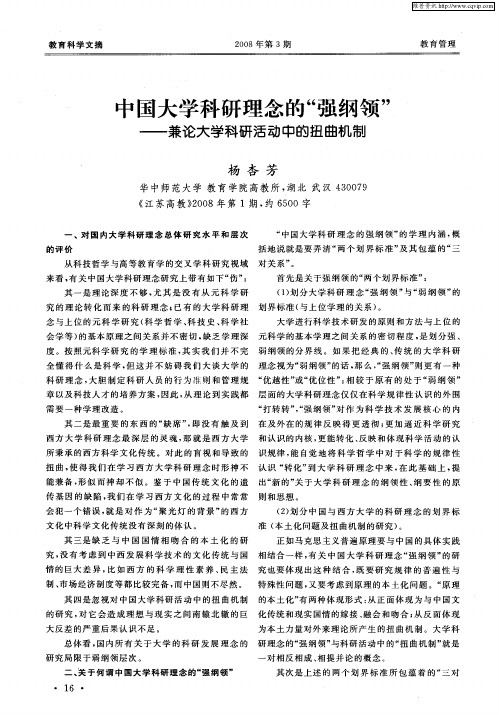
究 的 理 论 转 化 而 来 的 科 研 理 念 ; 有 的 大 学 科 研 理 划 界 标 准 ( 上 位 学 理 的关 系 ) 已 与 。
念 与 上 位 的 元 科 学 研 究 ( 学 哲 学 、 技 史 、 学 社 科 科 科
大 学 进 行 科 学 技 术 研 发 的 原 则 和 方 法 与 上 位 的
弱 的话 , 么 , 强 纲 领 ” 更 有 一 种 那 “ 则 全 懂 得 什 么 是 科 学 , 这 并 不 妨 碍 我 们 大 谈 大 学 的 理 念 视 为 “ 纲 领 ” 但
科 研 理 念 , 胆 制 定 科 研 人 员 的 行 为 准 则 和 管 理 规 “ 越性 ” “ 位 性 ” 相 较 于 原 有 的 处 于 “ 纲 领 ” 大 优 或 优 : 弱 章 以 及 科 技 人 才 的 培 养 方 案 , 此 , 理 论 到 实 践 都 层 面 的大 学 科 研 理 念 仅 仅在 科 学 规 律 性 认 识 的 外 围 因 从
制 、 场 经 济 制 度 等 都 比较 完备 , 中 国则 不 尽 然 。 市 而
特殊性问题 , 又要 考 虑 到原 理 的 本 土 化 问 题 。“ 理 原
其 四 是忽 视对 中 国 大 学 科 研 活 动 中 的 扭 曲 机 制 的 本 土 化 ” 两 种 体 现 形 式 : 正 面体 现 为 与 中 国 文 有 从 的研 究 , 它 会 造 成 理 想 与现 实 之 间 南 辕 北 辙 的 巨 化 传 统 和 现 实 国情 的 嫁 接 、 对 融会 和 吻 合 ; 反 面 体 现 从
维普资讯
教 育 科 学 文 摘
20 0 8年 第 3期
教 育 管 理
中 国大学科 研理念的“ 强纲领 ”
对理性解释模式的拒斥和否定—对强纲领哲学立场的考察
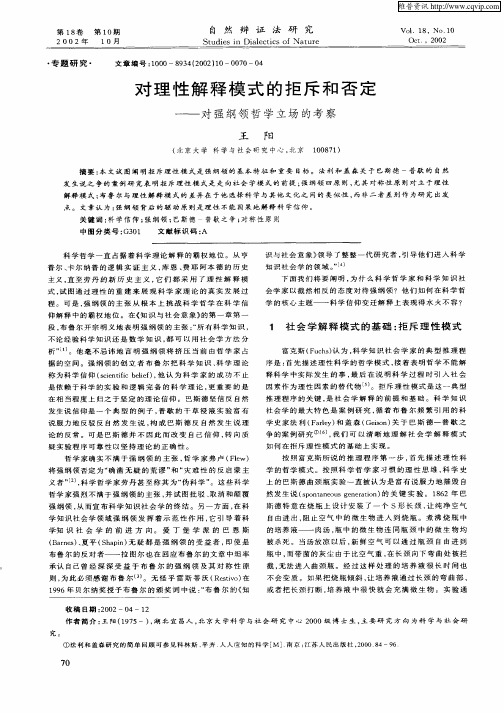
是 依 赖 于 科 学 的 实 验 和 逻 辑 完 备 的 科 学 理 论 , 重 要 的 是 更
在 相 当程 度 上 归 之 于 坚 定 的 理 论 信 仰 。 巴 斯 德 坚 信 反 自然 发 生 说 信仰 是 一 个 典 型 的 例 子 , 歇 的 干 草 浸 液 实 验 富 有 普 说 服 力 地 反 驳 反 自然 发 生 说 , 成 巴 斯 德 反 自然 发 生 说 理 构 论 的 反 常 。可 是 巴 斯 德 并 不 因 此 而 改 变 自 己 信 仰 , 向 质 转
疑 实验 程序 可靠 性以 坚持 理论 的 正确 性 。 哲 学家 确实 不满 于强 纲领 的 主张 , 学 家 弗卢 ( l 哲 Fe w) 将 强 纲 领 否 定 为 “ 凿 无 疑 的 荒 谬 ” “ 难 性 的 反 启 蒙 主 确 和 灾 义 者 ”2, 学 哲 学 家 劳 丹 甚 至 称 其 为 “ 科 学 ” 】科 伪 。这 些 科 学
会 学 家 以 截 然 相 反 的 态 度 对 待 强 纲 领 ? 他 们 如 何 在 科 学 哲 学 的核 心 主题—— 科 学 信仰变 迁解 释 上表现 得水 火不 容 ?
仰 解 释 中 的 霸 权 地 位 。 在 《 识 与 社 会 意 象 》 第 一 章 第 一 知 的
段 , 鲁 尔 开 宗 明 义 地 表 明 强 纲 领 的 主 张 :所 有 科 学 知 识 , 布 “
1 社 会 学 解 释 模 式 的 基 础 : 斥 理 性 模 式 拒
富 克 斯 ( u h ) 为 , 学 知 识 社 会 学 家 的 典 型 推 理 程 F c s认 科
不 论 经 验 科 学 知 识 还 是 数 学 知 识 , 可 以 用 社 会 学 方 法 分 都 析 ” 。他 毫 不 忌 讳 地 言 明 强 纲 领 将 挤 压 当 前 由 哲 学 家 占 】
“强纲领”SSK的相对主义特征
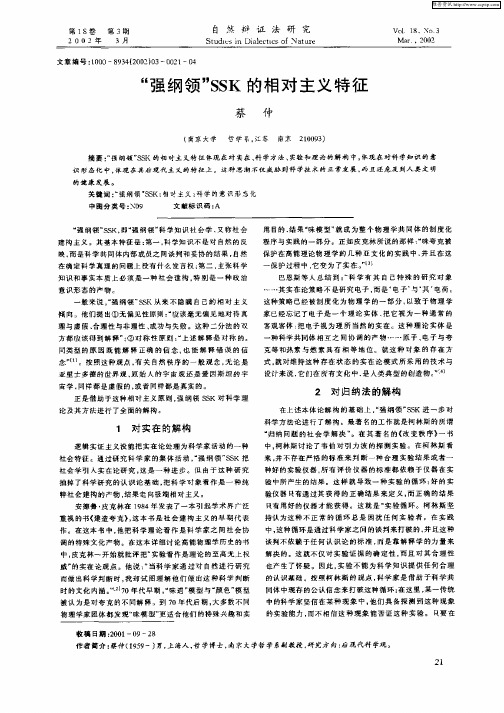
文 章 编 号 :0 0 9 4 2 D )3—02 一0 1 0 —8 3 {0 2 0 0l 4
‘ 纲 领蔡 仲
( 京大学 南 哲 学 系 , 苏 南京 20 9 ) 江 10 3 摘 要 :强 捆 领 ” S 的相 对 主 殳 特征 体现 在 对 实 在 、 学方 法 、 “ SK 科 实验 和 理 论 的 解 构 中 , 体现 在 对科 学知 识 的 意 识 形 态 化 中 , 现 在 其 后 琨 代 主 义 的 特 征上 。 这 种 思 潮 不 仅 威胁 到科 学 技 丰 的i 常发 展 , 且迁 危 且 到 人 类 文 明 律 f _ 而
克等 和热 素 与 燃 素 具 有 相 等 地 位 。 就 这 种 对 象 的 存 在 方
式, 就对维持这种存 在状态 的实在论 模式所采用 的技术与
设计 来 说 , 们在 所 有 文化 中 , ^ 类典 型 的 剖造 物 。 它 是 ”
正是借 助于这种相对 主义原 则 , 强纲领 S K对科学 理 S
1 对 实在 的解 构
逻 辑 实 证 主 义 没 能把 实 在论 处 理为 科 学 家 活动 的一 种 社 会 特 征 通 过 研 究 科 学 家 的集 体 活 动 , 纲 领 S K 把 强 S 社 会 学 引 入 实 在 论 研 究 , 是 一 种 进 步 。 但 由于 这 种 研 究 这 抽 掉 了科 学 研 究 的认 识 论 基 础 , 科 学 对 象 看 作 是 一 种 纯 把 粹社 会 建 构 的产 物 , 果走 向 极 端 相 对 主义 。 结 安德 鲁 - 克 林 在 1 8 皮 9 4年 发 表 了一 本 引 起 学 术 界广 泛
维普资讯
第1 8卷 第 3期
2 00 2 年 3月
- 1、下载文档前请自行甄别文档内容的完整性,平台不提供额外的编辑、内容补充、找答案等附加服务。
- 2、"仅部分预览"的文档,不可在线预览部分如存在完整性等问题,可反馈申请退款(可完整预览的文档不适用该条件!)。
- 3、如文档侵犯您的权益,请联系客服反馈,我们会尽快为您处理(人工客服工作时间:9:00-18:30)。
04,
David Bloor’s “Strong Programme in Sociology of Knowledge” (1976) 動機與緣起
Can the sociology of knowledge investigate and explain the very content and nature
of scientific knowledge? Many sociologists believe that it cannot. They say that knowledge as such, as distinct from the circumstances surrounding its production, is beyond their grasp. They voluntarily limit the scope of their own enquiries. I shall argue that this is a betrayal of their disciplinary standpoint. All knowledge, whether it be in the empirical sciences or even in mathematics, should be treated, through and through, as material for investigation. Such limitations as do exist for the sociologist consist in handing over material to allied sciences like psychology or in depending on the researches of specialists in other disciplines. There are no limitations which lie in the absolute or transcendent character of scientific knowledge itself, or in the special nature of rationality, validity, truth or objectivity.
It might be expected that the natural tendency of a discipline such as the sociology of knowledge would be to expand and generalise itself moving from studies of primitive cosmologies to that of our own culture. This is precisely the step that sociologists have been reluctant to take. Again, the sociology of knowledge might well have pressed more strongly into the area currently occupied by philosophers, who have been allowed to take upon themselves the task of defining the nature of knowledge. In fact sociologists have been only too eager to limit their concern with science to its institutional framework and external factors relating to its rate of growth or direction This leaves untouched the nature of the knowledge thus created (cf. Ben-David (1971), DeGre (1967), Merton (1964) and Stark (1958)).
一,科學知識的社會學(S.S.K.)vs. 科學社會學,強綱領的四個原則
1 It would be causal, that is, concerned with the conditions which bring about belief
or states of knowledge. Naturally there will be other types of causes apart from social ones which will cooperate in bringing about belief.(因果原則)
信念和「物」一樣,其生成自有其理由與原因。
naturalistic position.
2 It would be impartial with respect to truth and falsity, rationality or irrationality, success or failure. Both sides of these dichotomies will require explanation.(中立原則)
3 It would be symmetrical in its style of explanation. The same types of cause would explain say, true and false beliefs.(對稱原則)
非對稱性原則是一種目的論式的觀點,是輝格史觀的一種版本。
對稱性原則,相反地,可以看成是一種不可知論agnosticism,頁80。
也是一種有限論finitism。
尤拉猜想的數學史討論──社會學的有限論,頁81-3.
4 It would be reflexive. In principle its patterns of explanation would have to be applicable to sociology itself. Like the requirement of symmetry this is a response to the need to seek for general explanations. It is an obvious requirement of principle because otherwise sociology would be a standing refutation of its own theories.(反身原則)
重點:練習舉例子,真實或虛擬的。
同時,傳統的知識社會學、科學社會學、科學哲學,是否有反駁的可能?
1)來自知識自主性的論證,知識社會學的恰當領域變成是「錯誤社會學」!
2)來自於經驗論的論證,知識的生成變成來自個人式的感官經驗。
3)來自自我否定self-refutation的論證。
當初也曾引為批評Mannheim的知識社會學。
為了避免自我否定,知識社會學最好仍然局陷於錯誤社會學。
4) 其他反駁?
二,社會利益的解釋
早期的強綱領與外在論(或更早的馬克斯主義理論)的研究關係密切。
早期的遠程macro解釋,到近期的近程micro 解釋。
Shapin 討論骨相學的辯論、Pickering 討論基本粒子的辯論、Shapin & Schafer 討論空氣泵浦的爭議、波義耳與霍布士的爭議。
後來的行動者網絡理論,質疑強綱領過於強調社會實在(一切都需要有社會因果
解釋、社會利益解釋),卻沒有對稱地處理自然實在。
利益分析模式常碰到的幾個問題與弱點,頁86.。
